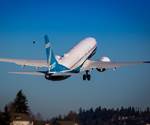Spirit AeroSystems announces 737 MAX production agreement with Boeing
Under the agreement, Spirit will restart production slowly, ramping up to reach a total of 216 MAX shipsets delivered to Boeing in 2020.

Boeing 737 MAX. Source | Boeing
Spirit AeroSystems (Spirit; Wichita, Kan., U.S.), which announced workforce reductions earlier this month following suspension of 737 MAX production by Boeing (Seattle, Wash., U.S.), announced on Jan. 30 that it has reached an agreement with Boeing regarding production rates for the aircraft.
Under the agreement, Spirit will restart production slowly, ramping up deliveries throughout the year to reach a total of 216 MAX shipsets delivered to Boeing in 2020. Spirit does not expect to achieve a production rate of 52 shipsets per month until late 2022. The parties are continuing to negotiate other terms, Spirit says.
According to Spirit, the rate agreement is based on several assumptions including Boeing’s expected production rate and the successful return of the 737 MAX to service. The 737 MAX contractual agreement is a requirements contract between Boeing and Spirit and the rate may change at any time.
Spirit is a significant supplier on the 737 MAX program, with its workshare accounting for 70% of the airplane’s structure. This includes the entire fuselage, thrust reversers, engine pylons and wing components. In addition, the MAX represents more than 50% of Spirit’s annual revenue.
Related Content
-
Automated robotic NDT enhances capabilities for composites
Kineco Kaman Composites India uses a bespoke Fill Accubot ultrasonic testing system to boost inspection efficiency and productivity.
-
First Airbus A350 crash confirmed in Haneda
Shortly after touch-down, a JAL A350-900 aircraft recently collided with a De Havilland Canada Dash 8. Exact circumstances are still unknown.
-
Development of a composite liquid hydrogen tank for commercial aircraft
Netherlands consortium advances cryogenic composites testing, tank designs and manufacturing including AFP, hybrid winding, welding of tank components and integrated SHM and H2 sensors for demonstrators in 2025.
.jpg;width=70;height=70;mode=crop)





